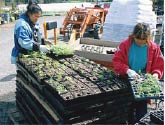Alternatives Abound
- Before selecting a crop enterprise a prospective farmer should thoroughly explore a multitude of different methods including the following:
- Fresh sales at local Farmer’s Markets,
- Fresh sales at roadside stands located on well traveled roads,
- Subscription sales of produce through an arrangement known as community supported agriculture (CSA),
- Choose and cut sales as for Christmas trees,
- U-pick sales as with berries, vegetables and pumpkins,
- Value-added sales of on-farm processed food,
- Retail sale of ornamentals at an independent garden center,
- Wholesale distribution of nursery plants
- On-farm processing of berries
- Catalog sales of nearly any farm commodity
Consider Direct Sales First
The highest potential return from sale of any horticultural product comes from when it is sold directly from the farm to the consumer. If the intermediate buyer, or broker is involved in the transaction the farmer’s return on investment will be reduced. It’s not uncommon to find that food producers capture only 20% or less of the retail value on commonly purchased items as found in a supermarket. Berries grown for the processing industry return one-third to one-half of the fresh market value.Ornamental and Christmas tree growers who sell to a broker generally only receive one-half of the retail value a plant.

Direct sales of course, require a directed marketing plan involving a considerable amount of promotion, recognition, and perseverance. A direct seller needs a positive, extroverted personality, and the inherent stamina associated with risk taking. Unless a farmer is creative, flexible, and independent, the direct sale of horticultural products generally will be less than successful. For the extroverted personality however, direct sales of farm fresh produce and nursery stock can be a personally satisfying career.
Niche Marketing
Horticultural crops lend themselves very well to niche marketing, better known as product differentiation. As opposed to the term mass marketing where every store has nearly identical merchandize, and returns on investment are inherently low, niche marketing offers the potential to build an entire enterprise based on a limited number of entirely and unique products which can often be sold at a much higher rate of return.
Direct marketers have the opportunity to build strong customer relationships. In the garden center trade it is not uncommon to find a nursery owner who states that 80% of his sales are to only 20% of his clientele. There is a very good potential for success if a good location is selected, and staffed with knowledgeable sales associates. Larger sizes of nursery are especially suitable to niche marketing as most consumers don’t know the inherent price of the plant. By utilizing the concepts of up-selling (stressing salesmanship over the product itself) nursery retailers have found that they can earn a much higher return on their investments.
Farming the Urban Fringe

The Washington State Legislature passed the Growth Management Act (GMA) in 1990 to encourage wise land use planning for both urban and rural areas. For farmers the GMA act has been responsible for the designation and regulations for resource lands such as farmlands and wetlands. By designating urban growth boundaries around cities in order to accommodate 20 years of growth, the sprawl of houses and roads onto farm ground has been curtailed.
Agricultural land preservation helps promote the development of small diversified horticultural farms on the urban boundaries of major cities in the Pacific Northwest. By knowing that their land is secure for a certain length of time farmers can plant perennial horticultural crops that often take 2–3 or more years to come into production. Urban consumers are attracted to the 20 minute drive from the city to the farm and the scenic views that nearby rural enterprises offer.
Time Commitment
Horticultural farms tend to be very time intensive. It takes time to organize planting, cultivating, harvesting, and marketing a crop. If your present employment occupies your entire day it can be very hard to establish a new venture. There simply won’t be sufficient hours in the evening, or the weekends to get everything done in a timely fashion. Don’t assume that a spouse or significant other has the time or interest either unless asked directly and sincerely.
Most horticultural crop farmers understand the time investment their business demands and thus hire additional labor. A small rural enterprise farmer may only need 1–2 additional hired hands during the bulk of the season, with additional part-time workers needed during the peak season of harvest or sale. In southwest Washington many farmers work together to share labor (as well as expertise). As Washington state has one of the highest minimum wage rates in the nation it behooves farmers to select and retain their skilled laborers.
Our pages provide links to external sites for the convenience of users. WSU Extension does not manage these external sites, nor does Extension review, control, or take responsibility for the content of these sites. These external sites do not implicitly or explicitly represent official positions and policies of WSU Extension.